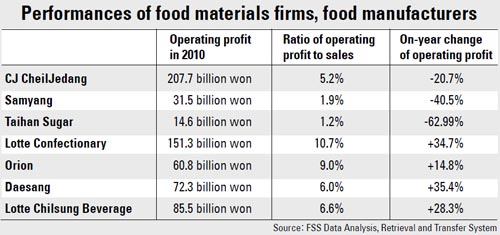
Market Information > 한국 농식품 시장뉴스
한국 농식품 시장뉴스
February 28, 2011
2011.02.28
http://english.yonhapnews.co.kr/business/2011/02/27/65/0501000000AEN20110227000500320F.HTML
Summary:
Soybean milk producers fined for price fixing [English, CSY, MJF]
http://joongangdaily.joins.com/article/view.asp?aid=2932794
Summary:
S. Korea to expand tariff quota on powdered milk, pork belly [English, CSY]
http://english.yonhapnews.co.kr/business/2011/02/28/25/0502000000AEN20110228002500320F.HTML
Summary:
A tariff quota is a quantitative threshold on imports, above which a higher tariff is applied. The lower tariff rate applies to imports within the quota, allowing policymakers to adjust duties on specified merchandise to help control inflationary pressure. Under the latest decision, the government will impose no import duties on 30,000 tons of powdered milk until the end of this year. It earlier sought to apply the tax exemption to 9,000 tons of the product by the end of June.
GNP demands dismissal of farm minister over FMD spread [English, CSY]
http://english.yonhapnews.co.kr/national/2011/02/28/21/0301000000AEN20110228001700315F.HTML
Summary: The Grand National Party (GNP) has formally asked President Lee Myung-bak to sack his farm minister over one of the worst outbreaks of foot-and-mouth disease here, party officials said Monday, as the ruling party struggles to woo voters ahead of the April 27 by-elections. The demand was delivered to presidential aides in their regular policy coordination meeting with officials at the GNP and the government on Sunday. "Participants from the GNP requested that the minister for food, agriculture, forestry and fisheries, Yoo Jeong-bok, take responsibility, as the foot-and-mouth problem has abated somewhat," a senior GNP official told Yonhap News Agency by phone, requesting anonymity.
Fresh bird flu strain confirmed in southern area [English, CSY]
http://www.koreatimes.co.kr/www/news/nation/2011/02/113_82126.html
Full text: About 1,000 ducks found dead earlier this week at a farm in southern
Food materials sector bears the brunt [English, CSY, MJF]
[NEWS IN FOCUS] Government policy prevents companies from raising prices, causing massive losses
http://joongangdaily.joins.com/article/view.asp?aid=2932788

Mixed Feed Price Soars as High as 8.1 Percent [Korean, OSY]
http://www.hankyung.com/news/app/newsview.php?aid=2011022534931&sid=0104&nid=004<ype=1
Summary: Local suppliers of mixed feed products for cattle and swine have increased the retail prices as high as 8.1 percent in February. Suppliers explained that the price increase was due to the rising price of raw ingredients, including corn, wheat, and soy meal, in the international market.
Local Retailers in Price War with Fresh Octopus Imported from
http://www.hankyung.com/news/app/newsview.php?aid=2011022534241&sid=0104&nid=004<ype=1
Summary: While leading department stores and hypermarkets have launched sales promotion around fresh octopus imported from
First whiskey festival draws diverse crowd [English, MJF]
http://joongangdaily.joins.com/article/view.asp?aid=2932790
Summary: Yesterday morning, 1,200 participants started tasting and viewing expensive single malts and blends from nearly 50 whiskey brands. Glitzy and sleek booths displayed spirits that definitely skewed toward the high-end, ranging from 12 to 35 years old.
The information in this report was compiled by the Agricultural Trade Office (ATO) at the U.S. Embassy in Seoul, South Korea. The press summaries contained herein do NOT reflect USDA, the U.S. Embassy, or other U.S. government agency official policy or view point. U.S. food exporters can learn more about market opportunities in South Korea by reviewing ATO Seoul’s Exporter Guide and other reports available at www.fas.usda.gov by clicking on “attaché reports”.
Agricultural Trade Office, U.S. Embassy - Seoul
Tel: 82-2-6951-6848 Fax: 82-2-720-7921
Email: atoseoul@usda.gov